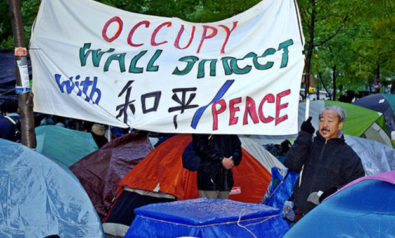Is the Occupy movement in Frankfurt the beginning of a civil society that occupies itself with the “hard facts” of finance, or is it loosing track? The activists’ discourses focalise on how a better financial world could be designed. Their demands remain decoupled from the current debates about bailout funds and the distribution of risks.
“Intellectual incest is what you get if problems are discussed over and over only in the same small circles”, says Erik Buhn. The 28-year-old student is part of the “Occupy: Frankfurt” movement that has garrisoned the green space in front of the European Central Bank since last October. For Erik, the debt and financial crisis that Germany and the rest of the globalised world is mired in cannot be solved by another brain wave of some expert committee: “We have to learn to use our own heads [again]”, says Erik. He explains that the movement aims to recapture the discussion about the way wealth is used and distributed in society; a topic that was left to expert circles a long time ago.
Erik and his colleagues seek to broaden the debate and have no restrictions on concepts or class: “We have brought even homeless people to formulate their own opinion on the issue”, he says. “This is the first movement that concerns society as a whole.” The movement’s aim is ambitious, for two reasons at least: First, for the German public, finance is a topic as abstract and complicated as the actual crisis itself. The national economy is on a high; unemployment is on a low. On a recent news broadcast, an interviewee said, “Everybody’s talking about crisis, but I do not see where it is.
Second, the goal of kicking off as broad-based a debate as possible, entails the risk of losing track of the financial objective. “We are a non-hierarchical movement and at the moment still in a state of discussion where everybody can bring in [their] demands”, says Erik. Occupy: Frankfurt’s activists demonstrate what that means: Individual demands range from the “abolishment of money” and a “minimum hourly wage of €12”, to monetary penalties for animal excrement on public streets. “Our basic demands for our demands” are that they are made peacefully, transparently and that they concern the 99%”, says Erik. “If propositions are in accordance with this canon, we discuss them.”
The German Occupy movement is still in a process of differentiation. Since March 2012, “Occupy Money” has become “another face”, a parallel initiative introduced by Hans Scharpf, real estate lawyer and Occupy activist. This face of the Occupy movement has much clearer features. According to its law of incorporation, the initiative concerns itself with the “functions and dysfunctions of the current monetary and financial systems” and wants to suggest improvements. Besides educational objectives, Occupy Money aims to establish an “alternative financial institute” in Frankfurt that shall serve as an example of how money can be dealt with in a way that serves public welfare. “Even the Sparkasse here in Frankfurt is not anymore in the hand of the state,” says Scharpf with a sorrowful face. The GLS Bank (in its own words “the first social-ecological universal bank”) supports Occupy Money and seems to be a blueprint for the kind of financial institution that the initiative is thinking of.
Occupy Money is supported by a range of academic experts and by a “full-grown funds manager”, Scharpf indicates. When asked about the young initiative’s goals, its ‘work in progress’ status becomes obvious: “Money shall not dominate, but benefit our society”, says Scharpf. “The state shall regain the sovereignty over the economy” and “public money shall be offered without interest rates”. The actual political debates about bailout funds, distribution of risk, and potential conflagrations of over-indebtedness, however, are not yet directly addressed. Rather, what the initiative does is to depict how a better and fairer financial world could be designed in the future. “These ethical questions are excluded in the technical speech of finance”, says Scharpf. For him, the current debates about equity ratios and risk weighing are only “plasters at a piston seizure”. Is this the beginning of an evolving civil society that occupies itself with the “hard facts” of finance? Dieter Rucht, protest researcher at the Wissenschaftszentrum Berlin für Sozialforschung, is rather skeptical: “Many activities in the Bafin, ECB, IMF, and the banking sector are just not understandable from the outside.” External experts, according to Rucht, thus have the big problem that they necessarily miss the important information. “Even states are at the mercy of the recommendations of financial experts that are first of all loyal to their organisations. This is why even an organisation like ‘Attac’, which was founded for financial regulatory purposes, has not achieved very much so far.”
But as a matter of course, the movement has to begin somewhere. And it is exactly this situation of information asymmetry and non-representative decision making that the Occupy movement does not want to accept. The activists will continue to bash their heads against walls built a couple of decades ago when finance was not a matter of public dissent. “We are working with 60% hope, 30% incompetence and 10% of what we have at our disposal”, says Erik without any sign of resignation in his face. “The camp may vanish, but the movement will go on.”
The views expressed in this article are the author's own and do not necessarily reflect Fair Observer’s editorial policy.
Support Fair Observer
We rely on your support for our independence, diversity and quality.
For more than 10 years, Fair Observer has been free, fair and independent. No billionaire owns us, no advertisers control us. We are a reader-supported nonprofit. Unlike many other publications, we keep our content free for readers regardless of where they live or whether they can afford to pay. We have no paywalls and no ads.
In the post-truth era of fake news, echo chambers and filter bubbles, we publish a plurality of perspectives from around the world. Anyone can publish with us, but everyone goes through a rigorous editorial process. So, you get fact-checked, well-reasoned content instead of noise.
We publish 2,500+ voices from 90+ countries. We also conduct education and training programs
on subjects ranging from digital media and journalism to writing and critical thinking. This
doesn’t come cheap. Servers, editors, trainers and web developers cost
money.
Please consider supporting us on a regular basis as a recurring donor or a
sustaining member.
Will you support FO’s journalism?
We rely on your support for our independence, diversity and quality.








Comment